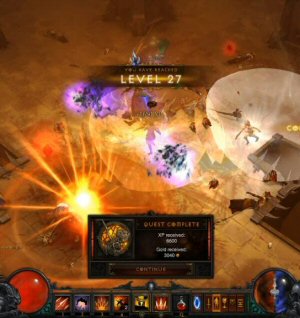When I learned that BioShock was set in an Objectivist society that had self-destructed, I assumed that the story was an attempt by the writer to refute the ideas of Objectivism. I imagined that the author read one of Rand’s books, was irritated by it, and set up the plot of BioShock to demonstrate it to be a load of crap. I was curious to see how much truth there was in that. (Short answer: None, really.) I’m not an Objectivist myself and I’m not interested in actually playing the game, but I thought I’d see what Objectivists had to say about the thing.
And I came up empty. Google had nothing to offer on the subject. Here is a game with a plot that is built around the philosophy, and not one Objectivist has written an analysis on it? How is that possible? If the game had been talking about specific political parties or religions, then the flame war would have gone on until the internet ran out of hard drive space. But not one Objectivist has played the game and talked about it?
I decided to ask an Objectivist myself. I asked Jennifer Snow, who graces the comment threads around here from time to time. She hadn’t played the game, but she put me in contact with The Inspector, who was kind enough to give me a lengthy and detailed look at Objectivism in the game. It turned out I wasn’t giving the writer nearly enough credit. The game isn’t a direct attack on the philosophy and the city of Rapture isn’t a strawman.
I found The Inspector’s answer so interesting that I thought I’d share. With his permission, here is the email he sent in reply:
While I consider myself an Objectivist, I don’t speak for Objectivism in any official capacity – only for myself. What you hear from me is my own best take on it. For the official source, you’ll want to visit The Ayn Rand Institute.
There are going to be some very heavy spoilers here – I’ll warn you of that right off the bat.
Is Bioshock an attack on Objectivism? Well, granted, it does portray a “perfect” society that most certainly has gone to hell, but there’s really a lot more to it than that.
For starters, there’s a major plot twist 3/4 through the game where you discover, basically, that you’ve been manipulated and lied to all along by the villain. And pretty much everyone else has, too. Once you discover this, with some thinking, you can see how just about every bit of information that’s been fed to you to demonize Andrew Ryan is actually misleading and taken out of context. There’s a lot made in the game of how everything’s looking all scary with arrests and martial law, but when you get right down to it, the people arrested really *were* working for the villain. In the end, you don’t really get the full story, but there is at least the possibility that Ryan really didn’t do anything morally wrong at all.
And, really, what you find in the game is that hardly any of the people in the city actually subscribe to Ryan’s vision. The thing that ultimately does them in is that so many of them are willing to lie, cheat, steal, and see no problem with working with this slimeball villain who’s trying the bring the whole place down. And even then, there’s a lot of conspiracy and manipulation on the villain’s part. It’s not really Ryan’s pseudo-Objectivist philosophy that’s failing, so much as it’s an example of what might happen to a society built on that philosophy if less than 1% of its constituant members actually subscribed to it. I don’t think that this, as a message, is any real threat to Objectivism since none of us has ever claimed that everything will get magically better if the law is structured right but society remains culturally and philosophically where it is. Every legitimate Objectivist organization I know of is saying that trying for political change is hopeless until we can achieve a cultural change – i.e. toward reason and individual rights.
Now of course, in the end the city does fall, and regardless of the fact that it’s all a grand conspiracy, this still does say something about the author’s view of the ideas on which the city was founded. But not, I think, in a direct I’m-against-Objectivism sort of way. Having talked to Ken Levine, I can say that the theme he’s after is wider than that. He’s making a comment on human nature itself. It’s not so much that he thinks Objectivism is specifically wrong – in fact he’s told me that from the limited amount of it he is familiar with, he found a lot of it to be quite admirable. But he’s one of those people that just doesn’t think that men can live up to it.
Getting specific, it’s a matter of certainty. Philosophic certainty, that is. Levine, like a lot of folks who were raised on modern philosophy, has an aversion to anyone or anything that claims to have certainty. When you think about it, the 20th century has been a display of many ideologies which claimed to be able to solve mankind’s problems with a grand restructuring of morality and society. One of the reactions to this is that some people have simply become afraid of anything that has a grand and certain vision.
This is actually quite ironic. It was Skeptical calls to philosophic uncertainty just like this which ended the Enlightment, thus paving the way to the totalitarian ideologies which followed. All such movements denied reason and scientific certainty – they had to, in order to deny rights, which were a product of that Enlightenment thought. A lot of people think that Marxism advocated reason or certainty, but that’s just because they’ve never deeply studied it. It actually rejects logic and reason in favor of a bunch of soothsaying mysticism dressed up in complicated-sounding terms like “dialectical materialism,” which have about as much to do with reason as that crazy guy on the corner who likes to yell things at passers-by. But most people have no idea of the actual cause of Nazism and Communism.
I think this sort of fear is a product of not really knowing the history of philosophy (well, that and the influence of philosophic Skepticism). I’m not exactly a professional scholar of it, myself, but there’s a lot of great Objectivist literature out there that really lays out the basics in an easy-to-understand fashion. Totalitarian states didn’t just happen out of nowhere – or simply because some people had a large vision that they tried to carry out, but human nature failed or something. They happened for very specific, repeatable, reasons. All totalitarian disasters share common philosophic premises and roots, such as collectivism and altruism – the idea that men exist to serve the collective. Once you learn that the philosophers behind Communism said that men don’t have rights, and morality consisted of whatever the collective wanted, then it isn’t surprising that their practitioners felt free to start marching people into gulags and gas chambers. And not only that, but the ideologies which created them can clearly be traced back through the movements and philosophers which gave root to them. They didn’t happen randomly, but rather because specific, related schools of thought became prevalent for decades before the disasters ensued.
So is Bioshock an indictment of Objectivism? I’d say no – and I’d even go so far as to say that it wasn’t even the author’s intent for it to be. He does have some tragic themes about human nature and certainty in there, which are definitely in disagreement with Objectivism, but I think that’s going at least three or four levels deeper than most folks will.
I know already that some of this is going to rub some people the wrong way, and that any discussion is inevitably going to trend towards politics and rancor. It wouldn’t be very fair for me to post this and then deny dissenters a chance to have their say, so I’m going to lift my moratorium on that sort of thing for this thread. On the other hand, the last few paragraphs tap into the very heat source for most hot-button topics. Individual freedom vs. the collective is at the root of every major political argument currently simmering out there, and a free-for-all thread is likely to have us swimming in magma before we know it.
 |
So please remember that this is a geek blog. We have a nice community here. We get along well enough, and I’d hate to see bitter feuds appear over previously obscured fault lines in the group. Keep it civil and don’t make it personal. Don’t post angry. I’d rather get along and talk about gaming than have a fight which will cause division without changing anyone’s mind, and I hope the above is a stimulating read no matter where you’re coming from.
 T w e n t y S i d e d
T w e n t y S i d e d









